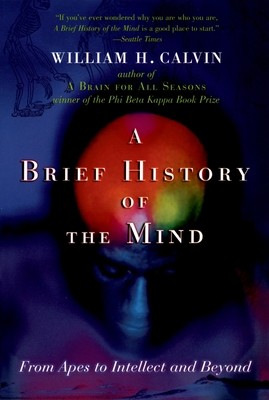
- We will send in 10–14 business days.
- Author: William H Calvin
- Publisher: Oxford University Press, USA
- ISBN-10: 0195182480
- ISBN-13: 9780195182484
- Format: 14.1 x 20.9 x 1.6 cm, minkšti viršeliai
- Language: English
- SAVE -10% with code: EXTRA
Reviews
Description
This book looks back at the simpler versions of mental life in apes, Neanderthals, and our ancestors, back before our burst of creativity started 50,000 years ago. When you can't think about the future in much detail, you are trapped in a here-and-now existence with no "What if?" and "Why me?" William H. Calvin takes stock of what we have now and then explains why we are nearing a crossroads, where mind shifts gears again.
The mind's big bang came long after our brain size stopped enlarging. Calvin suggests that the development of long sentences--what modern children do in their third year--was the most likely trigger. To keep a half-dozen concepts from blending together like a summer drink, you need some mental structuring. In saying "I think I saw him leave to go home," you are nesting three sentences inside a fourth. We also structure plans, play games with rules, create structured music and chains of logic, and have a fascination with discovering how things hang together. Our long train of connected thoughts is why our consciousness is so different from what came before.
Where does mind go from here, its powers extended by science-enhanced education but with its slowly evolving gut instincts still firmly anchored in the ice ages? We will likely shift gears again, juggling more concepts and making decisions even faster, imagining courses of action in greater depth. Ethics are possible only because of a human level of ability to speculate, judge quality, and modify our possible actions accordingly. Though science increasingly serves as our headlights, we are out-driving them, going faster than we can react effectively.
EXTRA 10 % discount with code: EXTRA
The promotion ends in 21d.21:54:05
The discount code is valid when purchasing from 10 €. Discounts do not stack.
- Author: William H Calvin
- Publisher: Oxford University Press, USA
- ISBN-10: 0195182480
- ISBN-13: 9780195182484
- Format: 14.1 x 20.9 x 1.6 cm, minkšti viršeliai
- Language: English English
This book looks back at the simpler versions of mental life in apes, Neanderthals, and our ancestors, back before our burst of creativity started 50,000 years ago. When you can't think about the future in much detail, you are trapped in a here-and-now existence with no "What if?" and "Why me?" William H. Calvin takes stock of what we have now and then explains why we are nearing a crossroads, where mind shifts gears again.
The mind's big bang came long after our brain size stopped enlarging. Calvin suggests that the development of long sentences--what modern children do in their third year--was the most likely trigger. To keep a half-dozen concepts from blending together like a summer drink, you need some mental structuring. In saying "I think I saw him leave to go home," you are nesting three sentences inside a fourth. We also structure plans, play games with rules, create structured music and chains of logic, and have a fascination with discovering how things hang together. Our long train of connected thoughts is why our consciousness is so different from what came before.
Where does mind go from here, its powers extended by science-enhanced education but with its slowly evolving gut instincts still firmly anchored in the ice ages? We will likely shift gears again, juggling more concepts and making decisions even faster, imagining courses of action in greater depth. Ethics are possible only because of a human level of ability to speculate, judge quality, and modify our possible actions accordingly. Though science increasingly serves as our headlights, we are out-driving them, going faster than we can react effectively.


Reviews